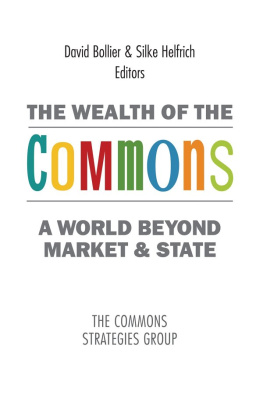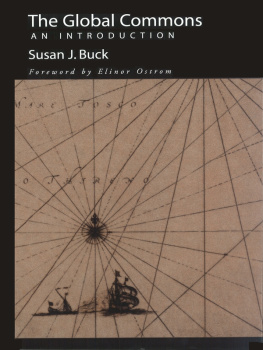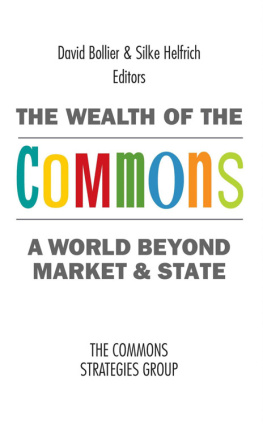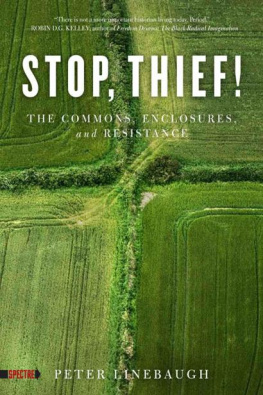Acknowledgments
Thisbook has been an extended global exercise in commoning a collective ventureof sharing, collaboration, negotiation and creative production among some ofthe most diverse commons scholars, activists and projects leaders imaginable.It is as if many, many different streams and rivers from all kinds of landscapeshad come together into a mighty new torrent. That, at least, is what theexperience of editing this rich, kalaidoscope of a book has been for us. It hasbeen a joy to engage with the 90 contributors to this volume; a privilege tolearn about their fascinating projects and absorb their reportage and analyses;and a challenge to assemble this book so that it would be rigorous enough foracademic readers yet accessible enough for the layperson.
Our first thanks, then, goes to the contributors who took the timeto share their experiences and thinking about the commons. We hope that theiressays, as now assembled in one volume, will begin to open up new conversationsthat might not otherwise occur. Many of them were brought to wider attention atthe landmark International Commons Conference in Berlin in November 2010. Inmany respects, this book is a continuation of the cross-discplinary, transnational,heart-to-heart dialogues that began there.
The Heinrich Bll Foundation has been an indispensable partner inthe conception and development of this book over the past two years. We wish tothank Barbara Unmig, President of the Foundation, for her unflagging support indeed, her demand for a book that would probe more deeply into the worldthat exists beyond market and state. Heike Lschmann, the head of Department ofInternational Politics at the Bll Foundation, was also a vital force inthinking through the themes of the book, developing its framework and pushingthe project forward. Our partner at the Commons Strategies Group, MichelBauwens, provided important insights and encouragement to us on numerousoccasions.
The Wealth of the Commons benefited greatly from the parallel preparation of a Germanedition of this book, edited by Silke Helfrich and the Bll Foundation. Thepreparation of that volume helped bring the English edition into focus, andmany essays written for the German edition were the basis for Englishtranslations for this volume. We are especially grateful to Sandra Lustig andCharles Roberts for their conscientious translations of many essays over thecourse of months, and their struggle to find just the right words for ideasthat are sometimes quite difficult to translate.
A huge thank you to the many people at the Bll Foundation whohelped in the preparation of either the German or English edition, or both.These people include Simone Zhr, Joanna Barelkowska and editor Bernd Rheinbergas well as friends and colleagues Brigitte Kratzwald, Katharina Frosch, ThomasPfeiffer, Martin Siefkes, Andreas Weber, Jacques Paysan, Stefan Meretz andStefan Tuschen.
Publishing this unusual book required that we find an unusualpublisher, one that could understand the significance of the commons and entertainimaginative publishing strategies. We found that publisher in Levellers Pressof Amherst, Massachusetts, and are grateful to Levellers director SteveStrimer for his innovative approach to book publishing.
David Bollier wishes to thank Ellen Bollier for her abiding loveand support during the rigors of yet another book project. Silke Helfrich isgrateful to her family, especially her kids for the enthusiasm and patiencethey show toward her endeavors.
We noted earlier that the preparation of this book was an exercisein commoning. Our immodest hope is that The Wealth of the Commons willbe but a simple foretaste of an outrageous banquet of commoning that liesahead.
DavidBollier
Amherst, Massachusetts USA
&
Silke Helfrich
Jena, Thringen Germany
Commons Strategies Group
May 1, 2012
Introduction
The Commons as a Transformative Vision
ByDavid Bollier and Silke Helfrich
CommonsStrategies Group
It has become increasingly clear that we are poised between an oldworld that no longer works and a new one struggling to be born. Surrounded byan archaic order of centralized hierarchies on the one hand and predatory marketson the other, presided over by a state committed to planet-destroying economicgrowth, people around the world are searching for alternatives. That is themessage of various social conflicts all over the world of the Spanish Indignadosand the Occupy movement, and of countless social innovators on the Internet.People want to emancipate themselves not just from poverty and shrinkingopportunities, but from governance systems that do not allow them meaningfulvoice and responsibility. This book is about how we can find the new paths tonavigate this transition. It is about our future.
But since there is no path forward, we must make the path. Thisbook therefore is about some of the most promising new paths now being developed.Its seventy-three essays describe the enormous potential of the commons inconceptualizing and building a better future. The pieces, written by authorsfrom thirty countries, fall into three general categories those that offer apenetrating critique of the existing, increasingly dysfunctional market/statepartnership; those that enlarge our theoretical understandings of the commonsas a way to change the world; and those that describe innovative workingprojects that are demonstrating the feasibility and appeal of the commons.
This book begins by offering a number of theoretical analyses ofthe importance of the commons to the contemporary political economy. PartI includes essays that explore, for example, the tragedy of the anticommons dynamicin which excessive, fragmented property rights impede innovation andcooperation; the important differences between common goods and publicgoods; and the ways in which the commons challenges some elemental principlesof modernity, liberalism and law. New thinking in theoretical biology suggeststhat the methodology of nature itself favors the commons as a stable,self-sustaining paradigm. The commons, then, is a paradigm that embodies itsown logic and patterns of behavior, functioning as a different kind ofoperating system for society. While many of its dynamics are still hidden tominds steeped in market culture, learning about particular commons can help usrecognize the commons as a useful, general paradigm.










